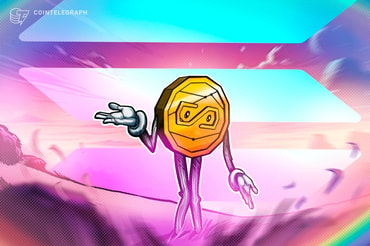The Protocol: EIGEN Riches Tempt Ethereum Devs, Even as ETF Approval Nears

A sudden jolt of optimism over the prospect that U.S. regulators might soon approve spot Ethereum ETFs has sent the ETH price soaring – up 21% this week in its best performance since August 2021.
But beneath the surface, there’s been tension in the Ethereum developer community over the largest smart-contracts blockchain’s future and progress toward decentralization. The sniping became especially acute with the revelations this week that two of the Ethereum Foundation’s biggest stars have accepted multimillion-dollar token incentive packages from EigenLayer, the pioneering restaking protocol that has been flagged as possibly posing a systemic risk to Ethereum. Read on.
ALSO:
This article is featured in the latest issue of The Protocol, our weekly newsletter exploring the tech behind crypto, one block at a time. Sign up here to get it in your inbox every Wednesday. Also please check out our weekly The Protocol podcast.
Ethereum Foundation’s Dankrad Feist, the namesake of “danksharding” and a central figure in this week’s drama in the Ethereum community (Bradley Keoun)
MEV SNIPING! It’s not clear exactly what started it all, but top Ethereum developers locked horns on the social-media platform X, in an intense and almost uncomfortable-to-observe debate touching on the practice of maximal extractable value, or MEV – essentially, the use of sophisticated trading bots to frontrun user transactions at the point of execution. On May 16, Ethereum core developer Péter Szilágyi tweeted about his despair over the lack of progress in pushing to solve some of the blockchain’s most vexing issues. “Voila, the banking system recreated,” he wrote. One of his points was that Ethereum had “glorified” MEV, remarking, ostensibly in sarcasm, that it was “futile to fight against MEV, so might as well lean hard on it, right?” (As chronicled in last week’s issue of The Protocol, even U.S. government officials now appear to characterize MEV as standard operating procedure on the blockchain.) Ethereum Foundation researcher Dankrad Feist retweeted Szilágyi’s post with the comment, “This is such a lazy take if you can’t also tell me what your supposed solutions are that let local block producers extract MEV.” A back-and-forth ensued, and then Ethereum co-founder Vitalik Buterin chimed in, tweeting that “I’m really proud that Ethereum does not have any culture of trying to prevent people from speaking their minds, even when they have very negative feelings toward major things in the protocol or ecosystem.” Buterin, who is known to write long, interrupted his work on a project in Kenya to bang out a 3,000-word-plus essay breaking down the issues, concluding: “I also do not think that the situation is anywhere near as hopeless as Peter’s tweets imply.”
ET TU, DANKRAD? The Buterin tweet referenced in that ^^^ episode touched off an entirely separate donnybrook. The pseudonymous crypto influencer Cobie responded to Buterin’s tweet, asking the very pointed question of how he felt about “core developers or researchers taking life–changing $ packages from projects built on Ethereum to become ‘advisors,’ when those projects may have conflicted incentives with Ethereum, either now or in the future.” At first it wasn’t quite clear what the comment referred to. But then, as reported by CoinDesk’s Margaux Nijkerk, a top Ethereum Foundation developer, Justin Drake, disclosed that he had taken on a role advising EigenFoundation, with “a significant token incentive which could easily be worth more than the combined value of all my other assets (mostly ETH),” and a value of “millions of dollars of tokens vesting over 3 years.” EigenFoundation supports the restaking protocol EigenLayer, a controversial project partly because experts have warned of its potential systemic risks to the Ethereum blockchain. Shortly after that, Feist (also mentioned ^^^) confessed that he, too, had accepted a paid role at EigenFoundation. The news set off a debate on crypto twitter about whether advising the EigenFoundation would constitute a conflict of interest. “Even if you pinky promise to not let this cloud your judgment, and do it on a personal capacity, that’s impossible,” wrote Lefteris Karapetsas. One clever jokester deadpanned that the Ethererum researchers were “restaking themselves now.”
ALSO:
Top picks of the past week from our Protocol Village column, highlighting key blockchain tech upgrades and news.
Throughput-Latency graph comparing Mysticeti-C performance with state-of-the-art consensus protocols (Arxiv)
1. Sui Foundation, supporting the Sui blockchain built around the Move smart-contracts language, announced the successful testnet deployment of Mysticeti, “a new consensus protocol that reduces consensus time on Sui by 80% to 390 ms, making it the fastest consensus layer in the industry,” according to the team.
2. StarkWare, the main developer firm behind the layer-2 blockchain Starknet, shared Wednesday plans for its own zero-knowledge rollup compatible with the existing Ethereum infrastructure, a setup commonly known as a zkEVM. The zkEVM, called Kakarot, already in testing, will be available via the Starknet Stack, a set of software tools that make it easier for developers to spin up their own customized application-specific chains.
3. Gnosis unveiled “Metri,” an on-chain self-custodial wallet operating within the Gnosis ecosystem allowing a wider set of users to access a realm of decentralized finance applications, according to the team.
4. COTI V2, describing itself as a “privacy-centric layer 2 on Ethereum,” unveiled its devnet, featuring Garbled Circuits, “an innovation that offers blockchain privacy 1,000x faster and 250x more efficient than current solutions,” according to the team.
5. Bitcoin layer 2 Bitfinity has introduced its Ethereum Virtual Machine (EVM) to bring smart contracts Bitcoin protocols and harness Runes to enable Bitcoin DeFi apps. Built on the Internet Computer (ICP) protocol, Bitfinity integrates with the Bitcoin network and allows asset bridging to other blockchains. Internet Computer’s tech stack will allow applications that use Ethereum’s smart contract programming language Solidity to access Bitcoin-based tokens.
Cosmos co-founder and Informal Systems CEO Ethan Buchman is scheduled to speak on the “bitcoinization of Cosmos” at Consensus 2024. (Bradley Keoun)
Bitcoin layer 2s. Ethereum restaking. Interoperability. AI. DePIN. Next-generation cryptography.
These are just a handful of the cutting-edge blockchain tech topics on the agenda at CoinDesk’s Consensus 2024 conference, which runs Wednesday, May 29, through Friday, May 31, in Austin, Texas.
For blockchain developers, it’s red meat. The three days are packed with opportunities to learn about the hottest crypto tech on Bitcoin, Ethereum, Solana, Cosmos and XRP Ledger – from the world’s top experts.
We took a spin through the agenda to identify stages and sessions likely to interest blockchain developers and people interested in the technology. Please check out our guide!
Go here for the full post by Bradley Keoun
Fundraisings
WeatherXM’s “M5” bundle (WeatherXM)
EDITOR’S NOTE: This blog post by the influencer Cobie on abusive crypto fundraising practices is getting a lot of traction. Also check out this detailed post on node sales by Impossible Finance’s Calvin Chu.
Deals and grants
Ether market roundup
Data and Tokens
May 29-31: Consensus, Austin Texas.
May 29-31: Bitcoin Seoul.
June 11-13: Apex, the XRP Ledger Developer Summit, Amsterdam.
July 8-11: EthCC, Brussels.
July 25-27: Bitcoin 2024, Nashville.
Aug. 19-21: Web3 Summit, Berlin.
Sept. 19-21: Solana Breakpoint, Singapore.
Sept. 1-7: Korea Blockchain Week, Seoul.
Sept. 30-Oct. 2: Messari Mainnet, New York.
Oct. 9-11: Permissionless, Salt Lake City.
Oct. 21-22: Cosmoverse, Dubai.
Oct. 23-24: Cardano Summit, Dubai.
Oct. 30-31: Chainlink SmartCon, Hong Kong
Nov 12-14: Devcon 7, Bangkok.
Nov. 20-21: North American Blockchain Summit, Dallas.
Feb. 19-20, 2025: ConsensusHK, Hong Kong
Edited by Bradley Keoun.
Disclosure
Please note that our privacy policy, terms of use, cookies, and do not sell my personal information has been updated.CoinDesk is an award-winning media outlet that covers the cryptocurrency industry. Its journalists abide by a strict set of editorial policies. In November 2023, CoinDesk was acquired by the Bullish group, owner of Bullish, a regulated, digital assets exchange. The Bullish group is majority-owned by Block.one; both companies have interests in a variety of blockchain and digital asset businesses and significant holdings of digital assets, including bitcoin. CoinDesk operates as an independent subsidiary with an editorial committee to protect journalistic independence. CoinDesk employees, including journalists, may receive options in the Bullish group as part of their compensation.
Bradley Keoun is the managing editor of CoinDesk’s Tech & Protocols team. He owns less than $1,000 each of several cryptocurrencies.
Learn more about Consensus 2024, CoinDesk’s longest-running and most influential event that brings together all sides of crypto, blockchain and Web3. Head to consensus.coindesk.com to register and buy your pass now.

Published on Other News Site












